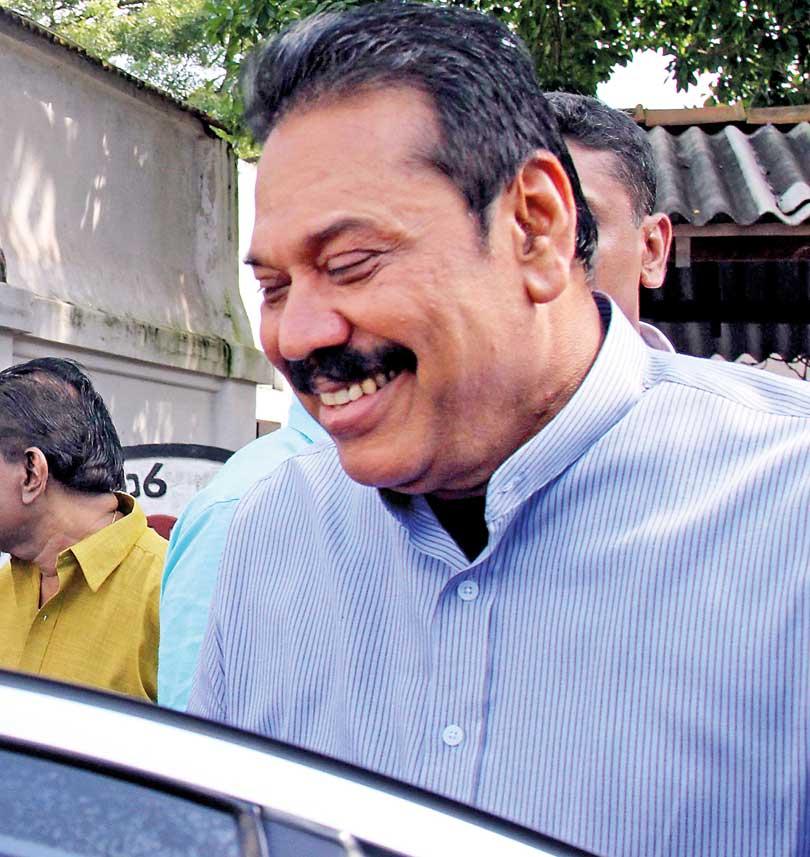Reply To:
Name - Reply Comment

“There are only two tragedies in life: one is not getting what one wants, and the other is getting it.’’
~Oscar Wilde
Mahinda Rajapaksa is an extraordinary individual. His passion for power seems to have overrun all plausible limits; his determination to cling on to something that is very tangible that comes in the guise of sheer ‘power’ saw to it that his political journey never came to an unforeseen halt. After entering Parliament in 1970 at a very tender age, thanks mainly to the ‘Blue Wave’ under Sirimavo Bandaranaike,MR’s first term in the House of the People was not a remarkable one. Raising the hand for each and every government-sponsored bill and engaging in heckling and harassing a depleted Opposition does not require a disciplined professionalism in Parliament.
Politics is not merely getting elected on a heap of empty election pledges and wasting time and public resources thereafter. Being subjected to a new political culture that saw the light of day in the wake of the ‘1956 Revolution’ and exposing birth pangs of another nihilistic and existentialist culture, a culture and behavioural pattern of those who came to occupy seats of power in Independent Ceylon, MR and other political tyros were no exception to the rule of the day. The Sirimavo-government was a coalition of the Bandaranaikes and socialists of post-Independent Ceylon. Their economic principle and policy began and ended with socialism, the total concept of which was, in effect, ‘State Capitalism’. Sloganeering and palatable phrasing of harsh economic measures began gaining ground in the immediate aftermath of the ’70 general elections.
MR learnt his political ABC from Sirimavo/Felix combine
Brainwashed in a populist political agenda, MR could not understand the nuanced aspects of liberal democracy and was closely tutored by a charismatic leader of the stature of Sirimavo Bandaranaike. MR could experience,on a firsthand basis, how giants like N. M. Perera, Colvin R. de Silva and Pieter Keuneman cowed down to Sirimavo. His close association with Anura Bandaranaike at the time was well known in all political circles and that association would have helped MR a whole lot which he could not learn at school. That learning included, among others, as to how a democratically elected government could assemble all powers within a single family. It may have occurred to him at that time that one day he could replace the ‘Bandaranaike Family Rule’ with a ‘Rajapaksa Family Rule’, which he did.
 He surely has learnt how to navigate a flimsy boat in ferocious waters. Sirimavo was a unique leader. She, unlike other SLFP leaders, was fortunate to have had the services of one of the most intensely sharp political minds Sri Lanka ever produced, Felix Dias Bandaranaike, a distant relation of SWRD Bandaranaike. Felix, unlike his contemporaries in the SLFP clique, was a results-oriented politician. And Sirimavo’s trust and dependability on him was total and unreserved. A brilliant student at Colombo Royal College and Law College, Colombo, Felix, in fact, barring JR Jayewardene, did not have any match. But his propensity towards ‘one-man rule’ (in this case, ‘one-family rule’) ultimately led to an electoral debacle for the SLFP a process that also claimed the political lives of longtime parliamentarians such as NM, Colvin and Pieter.
He surely has learnt how to navigate a flimsy boat in ferocious waters. Sirimavo was a unique leader. She, unlike other SLFP leaders, was fortunate to have had the services of one of the most intensely sharp political minds Sri Lanka ever produced, Felix Dias Bandaranaike, a distant relation of SWRD Bandaranaike. Felix, unlike his contemporaries in the SLFP clique, was a results-oriented politician. And Sirimavo’s trust and dependability on him was total and unreserved. A brilliant student at Colombo Royal College and Law College, Colombo, Felix, in fact, barring JR Jayewardene, did not have any match. But his propensity towards ‘one-man rule’ (in this case, ‘one-family rule’) ultimately led to an electoral debacle for the SLFP a process that also claimed the political lives of longtime parliamentarians such as NM, Colvin and Pieter.
MR who learnt his political ABC from the Sirimavo/Felix-combine apparently learnt only the uncouth lessons. MR was either too lazy to learn or did deliberately choose to disregard the consequences of the politics of quasi-dictatorship cum family rule. Fortunately, or unfortunately, Sirimavo/Felix-combine was not to enjoy the uses and abuses of Presidential powers. Were he given the Presidential powers that were inherent in that office, Felix would have schooled MR. Absence of a brainy political mind close to him was greatly felt in the MR-era. Basil or Gotabhaya was no match to Felix. In fact, inserting Basil’s and Gotabhaya’s names into the same sentence with Felix would be an insult to the stature and brain power of Felix Dias Bandaranaike.
Yet, how did MR become so powerful a political figure in the first decade of the 21st century? The answer is simple: Presidential powers and victory against the LTTE. MR learnt from his predecessor, Chandrika Bandaranaike (CBK), the daughter of Sirimavo, the enormity of the inherent powers in the Executive Presidency but greed for material wealth and comforts conquered the ultimate electability, come election time. MR’s singular loyalty to the majority of voters, Sinhalese Buddhists, and dependency on his brother Basil to deliver them at the polling station, through the Grama Niladarai, Agriculture Extension Officer and Samurdi Niladarai, the three most decisive government servants at the grassroots level, failed in 2015. It was even alleged that raw cash was given away to the voters in the villages on the day before election.
It was the SLFP-led coalitions that were in power from 1994 to 2014. From 1994 up till 2004, while CBK, the President of the country was sleeping, MR collected his manpower around his immediate family. The Siblings and children gathered around the patriarch and tried to fine-tune the machinery of Presidential Powers. Instead of fine-tuning, they produced an ugly, out-of-tune symphony of cohorts and henchmen and women. The nepotistic cabal to which MR gave birth made the nepotism so openly practised by Sirimavo as Prime Minister from 1970 to 1977 look like mere child’s play.
Yet after becoming President, MR had some of his loyalists occupying key government positions: Lalith Weeratunga as Secretary to President, P. B. Jayasundara as Secretary to Ministry of Finance and Ajith Nivad Cabraal as Governor of the Central Bank. To this critical mass MR added his own brother Gotabhaya as Secretary to the Ministry of Defence. His elder brother Chamal became the Speaker of the House of Parliament and Basil, the other younger brother became the Minster of Economic Development.
The circle was complete. The architecture was visibly in place. The styling, the process and the product of planning, designing, and constructing a mansion- the very definition of architecture- of unreserved dishonesty, corruption and nepotism was born. Along with this brutal architecture was also generated a genesis of a culture that is still in glaring display, a reflection of a nation that should be ashamed of, mortified and embarrassed with painting of its already docile and tedious profile. A hapless subject people inhaled the outer fragrance of an inwardly rotten culture. From the peon to the highest officer in government service was openly engaged in bribery and swindling off public funds. An unsuspecting general public became willing enablers of a rotting system and decomposing of a nation’s behavioural design.
MR, designer of this brutal architecture, sat atop this heap of trash which he created with the help of his siblings, henchmen and immediate family. The war-victory against the LTTE, he thought and argued, gave him licence to do all this pillage. The people too endured their own decay for the visible seductions were sufficient for their starving spirit. An uninspired soul was being fed by an equally crooked and fraudulent predator. An uncommon spectacle of predator and prey indulging in a macabre sharing of a nation’s material and spiritual wealth was in parade. Once again the sculptor of this ugly and brutal architecture watched with gleeful eyes and poised demeanour.
MR fine-tuned the machinery of Presidential Powers
This is the culture the Rajapaksas want this country to go back to. The loss of power was not limited to the mere power over man and woman; the loss of material wealth was a vital and fundamental part of that defeat. Twenty years is a long time to be in power, especially in a democracy where rulers are elected by the people. Electoral fatigue can set in; repeat of failed policies and intolerance of criticisms and brutal suppression of free speech and free movement follow in a time when rulers themselves get tired of seeing the same old cronies hovering around the pillars of power. But the voracious hunger for power of the Rajapaksas and their Parliamentarian-cronies seems insatiable.
In the midst of such a brutal setting, the next Presidential Election will be held. The anger and a concealed call for vengeance for the ungrateful Sirisena shall sustain the Rajapaksas’ efforts; their seemingly easy access to cash would bear the increasing dependency on it and it’s availability among their cohorts would further encourage them to go on a cash-spree-election campaign that might outspend all other previous campaigns put together.
All these and more has contributed to the architecture MR has created with his perverted and avaricious mind. The design is not unique but its unseen lines and strokes have generated a working structure that is, to use an oft-repeated cliché, outside the box. But Sri Lankans need to be more focused than they have shown to date. An embarrassing mindset that is ever so susceptible to the caprices and impulses of electioneering is going to make a bad situation unpalatably worse. If that occurs, that is a victory for the Rajapaksas, however big or small.The architecture MR could claim ownership to, could devour the land and her people and any recovery would take at least a generation or two.
That architecture must be done away with; its consequential culture must be exposed to what it is: one of corruption, nepotism and dishonesty. Prime Minister Ranil Wickremesinghe might be ineffective and uninspiring; but for the sustenance of our democracy, the most ineffective and uninspiring Ranil is one hundred times better than MR. MR and Company have got to go!
‘Carthago delenda est’. Carthage must be destroyed!
The author can be contacted at [email protected]